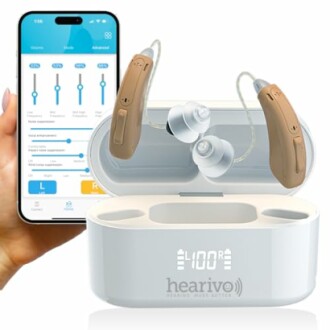
How to Choose the Right Hearing Aids for Seniors
Key Takeaways
- Consider lifestyle needs and hearing loss severity.
- Prioritize comfort, technology features, and usability.
- Explore options like Bluetooth connectivity and app control.
- Consult a professional audiologist for personalized recommendations.
Choosing the right hearing aids is a significant decision for seniors and their families. With various models and features available, it can be overwhelming to find the right match. This article will guide you through the essential considerations for selecting hearing aids to effectively enhance the hearing experience for seniors.
Understanding Hearing Loss in Seniors
Hearing loss is a common issue among seniors, often affecting their quality of life. Here are some insights into the types of hearing loss:
| Type of Hearing Loss | Description | Common Causes |
|---|---|---|
| Conductive Hearing Loss | Occurs when sound waves cannot efficiently travel through the outer ear canal to the eardrum. | Ear infections, earwax build-up, or fluid in the middle ear. |
| Sensorineural Hearing Loss | Results from damage to the inner ear or auditory nerve, affecting sound clarity. | Aging, exposure to loud noise, or illness. |
| Mixed Hearing Loss | A combination of conductive and sensorineural hearing loss. | Varies depending on individual circumstances. |
Key Features to Look for in Hearing Aids
When selecting hearing aids, consider the following features:
- Sound Quality: Look for hearing aids that offer clear sound quality tailored for your specific hearing loss.
- Bluetooth Connectivity: This feature allows you to connect to smartphones, TVs, and music devices, enhancing your listening experience.
- Adjustable Settings: Some hearing aids come with app controls, enabling users to personalize sound settings based on their environment.
- Comfort: Ensure the hearing aids fit well and can be worn comfortably for extended periods.
- Battery Life: Consider rechargeable options to avoid the hassle of changing batteries often.
Tips for Choosing the Right Hearing Aids
Beginner's Section
- Consult an Audiologist: Get an accurate assessment of hearing loss to determine the best type of hearing aid.
- Test Different Styles: Try on various types (behind-the-ear, in-the-ear) to see which is the most comfortable and functional.
- Assess Your Lifestyle: If you are active or frequently in noisy environments, choose hearing aids designed for those conditions.
- Research Brands: Investigate reputable brands for warranty and customer service support.
How Technology Enhances Hearing Aids
Modern hearing aids have integrated technology to sustain performance and user satisfaction:
| Technology Feature | Description |
|---|---|
| Noise Cancellation | Reduces background noise, focusing on sounds that matter. |
| Tinnitus Masking | Helps manage tinnitus symptoms by producing a masking sound. |
| Voice Recognition | Improves understanding in crowded or noisy environments. |
Featured Product: QV Pro Rechargeable Hearing Aids
The QV Pro Rechargeable Hearing Aids by Hearivo stands out for seniors looking for a reliable and feature-rich solution:
QV Pro Rechargeable Hearing Aids
Experience unparalleled sound clarity with Bluetooth connectivity, adjustable settings, and tinnitus masking features, perfect for everyday use.
Learn MorePros and Cons of Hearing Aids
Pros
- Improved communication and quality of life.
- Many models come with advanced features.
- Customizable settings to suit individual needs.
Cons
- Can be expensive depending on features.
- Battery life can vary significantly.
- Initial adjustment period may be required.
Conclusion
Choosing the right hearing aids for seniors involves understanding individual needs, exploring available technologies, and consulting professionals. The right choice can greatly enhance communication and overall quality of life for seniors.
